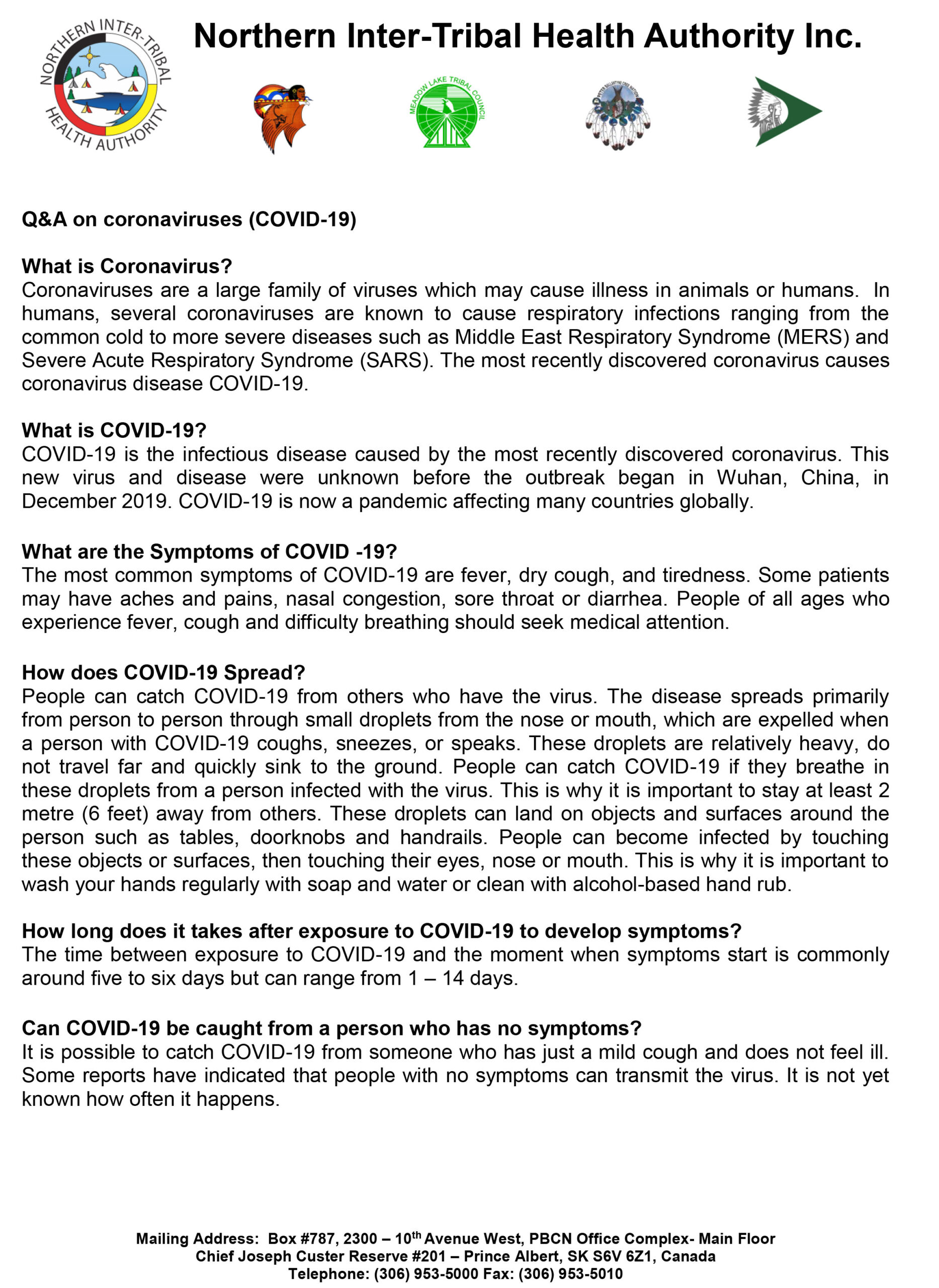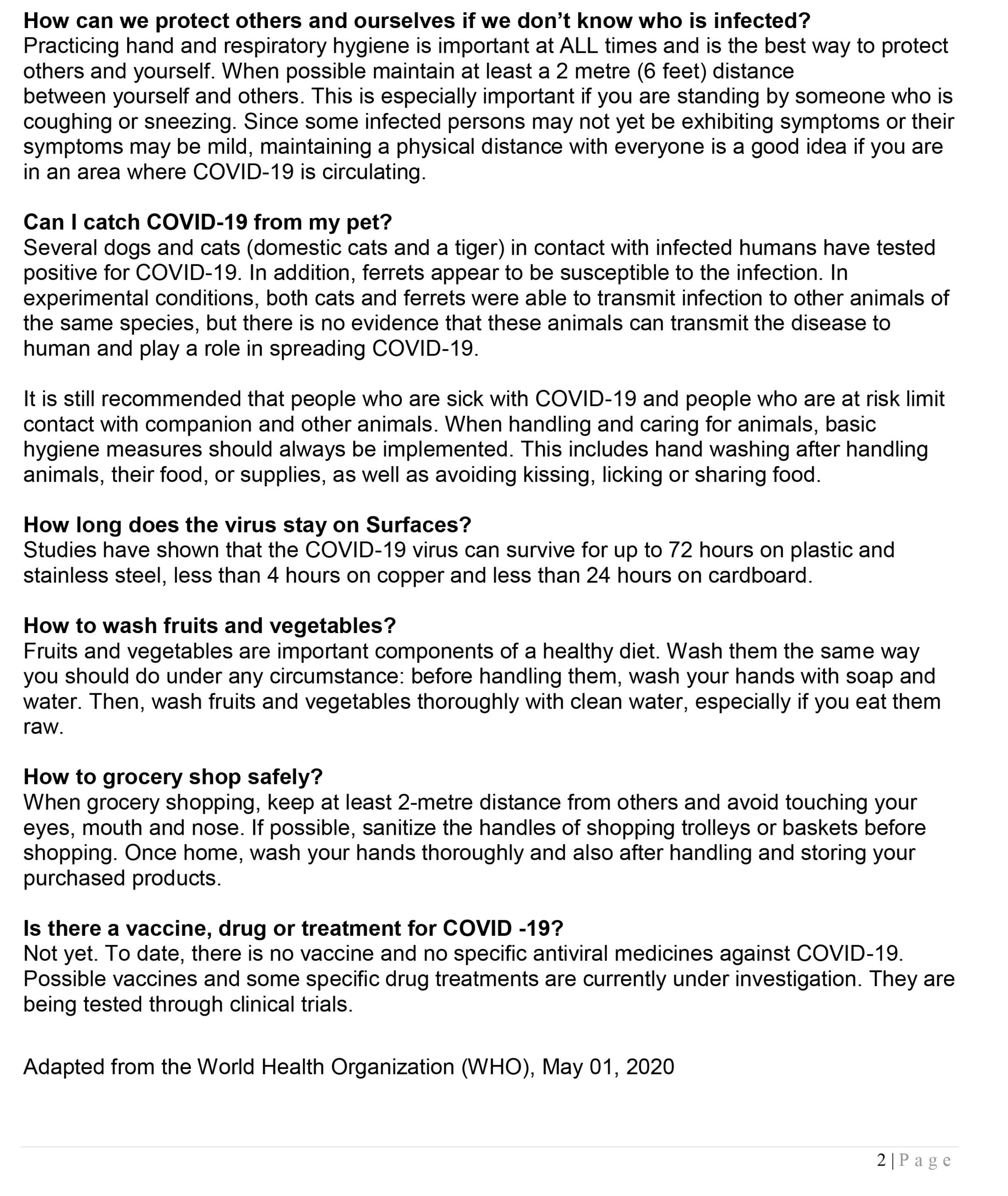Q&A on coronaviruses (COVID-19)
Click Link to Print – Q&A on coronaviruses (COVID-19)
What is Coronavirus?
Coronaviruses are a large family of viruses which may cause illness in animals or humans. In humans, several coronaviruses are known to cause respiratory infections ranging from the common cold to more severe diseases such as Middle East Respiratory Syndrome (MERS) and Severe Acute Respiratory Syndrome (SARS). The most recently discovered coronavirus causes coronavirus disease COVID-19.
What is COVID-19?
COVID-19 is the infectious disease caused by the most recently discovered coronavirus. This new virus and disease were unknown before the outbreak began in Wuhan, China, in December 2019. COVID-19 is now a pandemic affecting many countries globally.
What are the Symptoms of COVID -19?
The most common symptoms of COVID-19 are fever, dry cough, and tiredness. Some patients may have aches and pains, nasal congestion, sore throat or diarrhea. People of all ages who experience fever, cough and difficulty breathing should seek medical attention.
How does COVID-19 Spread?
People can catch COVID-19 from others who have the virus. The disease spreads primarily from person to person through small droplets from the nose or mouth, which are expelled when a person with COVID-19 coughs, sneezes, or speaks. These droplets are relatively heavy, do not travel far and quickly sink to the ground. People can catch COVID-19 if they breathe in these droplets from a person infected with the virus. This is why it is important to stay at least 2 metre (6 feet) away from others. These droplets can land on objects and surfaces around the person such as tables, doorknobs and handrails. People can become infected by touching these objects or surfaces, then touching their eyes, nose or mouth. This is why it is important to wash your hands regularly with soap and water or clean with alcohol-based hand rub.
How long does it takes after exposure to COVID-19 to develop symptoms?
The time between exposure to COVID-19 and the moment when symptoms start is commonly around five to six days but can range from 1 – 14 days.
Can COVID-19 be caught from a person who has no symptoms?
It is possible to catch COVID-19 from someone who has just a mild cough and does not feel ill. Some reports have indicated that people with no symptoms can transmit the virus. It is not yet known how often it happens.
How can we protect others and ourselves if we don’t know who is infected?
Practicing hand and respiratory hygiene is important at ALL times and is the best way to protect others and yourself. When possible maintain at least a 2 metre (6 feet) distance
between yourself and others. This is especially important if you are standing by someone who is coughing or sneezing. Since some infected persons may not yet be exhibiting symptoms or their symptoms may be mild, maintaining a physical distance with everyone is a good idea if you are in an area where COVID-19 is circulating.
Can I catch COVID-19 from my pet?
Several dogs and cats (domestic cats and a tiger) in contact with infected humans have tested positive for COVID-19. In addition, ferrets appear to be susceptible to the infection. In experimental conditions, both cats and ferrets were able to transmit infection to other animals of the same species, but there is no evidence that these animals can transmit the disease to human and play a role in spreading COVID-19.
It is still recommended that people who are sick with COVID-19 and people who are at risk limit contact with companion and other animals. When handling and caring for animals, basic hygiene measures should always be implemented. This includes hand washing after handling animals, their food, or supplies, as well as avoiding kissing, licking or sharing food.
How long does the virus stay on Surfaces?
Studies have shown that the COVID-19 virus can survive for up to 72 hours on plastic and stainless steel, less than 4 hours on copper and less than 24 hours on cardboard.
How to wash fruits and vegetables?
Fruits and vegetables are important components of a healthy diet. Wash them the same way you should do under any circumstance: before handling them, wash your hands with soap and water. Then, wash fruits and vegetables thoroughly with clean water, especially if you eat them raw.
How to grocery shop safely?
When grocery shopping, keep at least 2-metre distance from others and avoid touching your eyes, mouth and nose. If possible, sanitize the handles of shopping trolleys or baskets before shopping. Once home, wash your hands thoroughly and also after handling and storing your purchased products.
Is there a vaccine, drug or treatment for COVID -19?
Not yet. To date, there is no vaccine and no specific antiviral medicines against COVID-19. Possible vaccines and some specific drug treatments are currently under investigation. They are being tested through clinical trials.
Adapted from the World Health Organization (WHO), May 01, 2020

